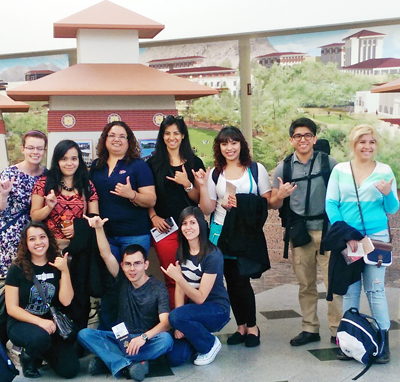By Kristopher Rivera
UTEP News Service
Donna Ekal is passionate about the steps students need to take to get through college and earn a degree, and one of her projects is to expand dual-credit opportunities for high school students in El Paso.
A preliminary study at UTEP found students who take a dual-credit class in high school have a better chance of graduating from college in four to six years than students who do not.

“Now we want to do a little more work and find out why,” said Ekal, Ph.D., associate provost for the Office of Undergraduate Studies at UTEP. “We think that it has to do with how we define access by looking at the four categories of access: aspirational, academic, financial and participatory. Taking a dual-credit class in high school gives you that aspirational, ‘Wow, I took a college-level class in high school. I can do this. I can be successful in college-level classes.’”
There are many success stories of UTEP students who earned dual credit while in high school.
Aimee Olivas, senior political science major and fall 2014 graduate, set a milestone in her family’s history: her parents grew up in Juárez, Mexico. Her mother dropped out of high school and her father stopped his education after middle school.
“Taking college classes while in high school helped me be a lot more responsible,” said Olivas, who graduated from Mission Early College High School as salutatorian. “If I were to have gone through regular high school, I probably wouldn’t have been doing my work.”
However, Olivas hit a roadblock during her second year in the early college high school program when her father passed away.
“What was really awesome about early college high school is we were all really close, so they helped me out a lot in that aspect as well,” Olivas said.
Olivas earned her associate degree before finishing high school. By the time she earned her high school diploma, she had already started taking courses at UTEP.
“I know my family is really proud of me, so that bumps up my confidence,” she said. “It makes me feel that I’m ahead and that I’ve completed some of my goals when years ago I thought I wouldn’t make it this far.”
At the age of 20, Olivas will graduate with honors and continue her education to earn a Master’s in Business Administration. She will have no student loan debt as a result of scholarships she received with help from the Office of Undergraduate Studies.
Like Olivas, Riane Stene will finish her studies at UTEP with no debt. Stene graduated from Northwest Early College High School with an associate degree and a high school diploma. She qualified for several scholarships that covered her tuition and her parents were thrilled not to have to pay anything for their daughter’s education.
“My very first year out of high school, (my) first year after college, I got an internship in Virginia for a pharmaceutical company, which they only award to rising juniors and rising seniors in college,” she said.
Stene was a 19-year-old among 22- and 23-year olds.
“A lot of people who attended these early college high schools seem more mature and prepared for real world situations,” she added.
After graduating in May with a bachelor’s degree in chemistry, Stene will soon begin a fully funded doctoral program in radiochemistry at Washington State University.
The Office of Undergraduate Studies will continue to assess the effectiveness of dual-credit programs on students as measured by their success at UTEP. That will help them fine-tune the programs to be the most helpful for students.
In addition, Ekal and her team are writing grant proposals to receive scholarships for teachers and create programming support so more regional teachers can become credentialed to teach college-credit classes in the high schools.